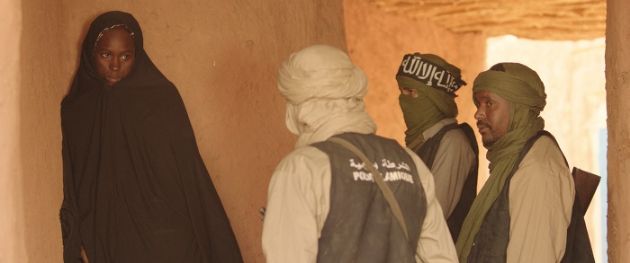
Timbuktu, that faraway place, the end of the world, is an actual city in Northern Mali in Africa, being once the bustling trade town in sub-Saharan Africa and famous for its fabulous architecture, libraries and scholars. Abderramane Sissako (Bamako) tells a tragic tale based on true events, taking place in this famed city.
The film starts with traditional wooden African statues being used as targets in a target practice by the Islamic militants who just rolled into town. When Alain Resnais and Chris Marker made Even Statues Die, I don't think this was the image they had in mind: they were talking about reappropriation of those artifacts being mass produced for Western consumption, losing its intended cultural significance, not being literally blown to pieces. Now times have changed. These so called jihadists, walks around with AK-47s across their chest, warning the townsfolk that they are under strict sharia law from now on - no smoking, no music, women have to cover their hands, faces and feet, no public gatherings, the list goes on. Despite city imam's pleading, they start arresting people and carrying out the punishment - public lashings or executions for playing music, unmarried men and women hanging out together, playing football, women washing their hair in public.... They even start marrying their young soldiers (who don't even speak the language) to local girls without their parents' consent.
In the midst of all this, is a story of Kidane, a nomadic herder with his beautiful wife and daughter, living in the desert. All their friends and neighbor are gone, fearing these rude Arabs from the north. But he and his family have no intention of moving on. They have seen many occupiers come and go, so this also will pass. Besides they don't have anywhere else to go. A tragedy strikes when one of his cows gets killed by a local fisherman and during heated dispute, Kidane accidentally kills the fisherman. He is promptly arrested and condemned to death by sharia law.
Timbuktu's tragedy is accentuated by achingly beautiful surroundings shot in widescreen format by cinematographer Sulfiane El Fani (Blue is the Warmest Color). There is a lyrical sequence of young people playing soccer without the ball in the sun drenched desert. They sprint, pass the invisible ball, score or block and cheer. A sort of an impromptu in-your-face defiance and condemnation, highlighting the ridiculousness of the law. The sequence is both comical and sad.
Sissako paints a complex society where several different languages are spoken. Even though all of the inhabitants of Timbuktu are people of faith, the director makes it clear that they have different cultural backgrounds and customs. Timbuktu is a strong statement against the extreme Islamic militants who seem to take the moral high ground and impose their laws upon people they don't understand. It's even more disgusting when they don't even try to understand. We've seen this kind of hubris time and time again in any types of colonial occupying forces. And we know that it breeds human tragedies everywhere.
As the film builds up to its heartbreaking conclusion, one wonders the true fate befallen on Timbuktu and its inhabitants in 2012 when it was briefly taken over by Islamic rebels - many were killed and maimed. Its famed Ahmed Baba Institute which housed many invaluable manuscripts was set on fire. The film is a beautifully told human tragedy and strong condemnation of religious extremism.
Timbuktu won Prize of the Ecumenical Jury and François Chalais Prize at this year's Cannes Film Fest. The film screens on 10/1 at 6pm and again 10/2 at 4pm. For more information, please visit FSLC website.